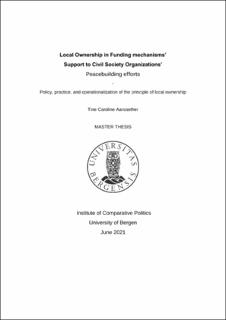| dc.description.abstract | With the purpose of delivering “clarity through specificity” (Uphoff and Cohen 1980), this thesis explores the vaguely defined concept of local ownership in the area of international funding mechanisms support to “local” civil society’s peacebuilding efforts in post agreement Colombia. It looks at Colombian civil society organizations (CSOs) understanding and perceptions of the principle, its presence in relevant policies, and how different aspects of local ownership are affected by the operational procedures and practice of the three selected funds (or funding mechanisms) for support to civil society (UN Multi-Partner Trust Fund for Sustaining Peace in Colombia (UNMPTF), European Union Trust Fund for Peace in Colombia and FOS – Swedish Norwegian Fund for support to Colombian civil society). Finally, based on CSOs input and the findings in relevant policies and funding mechanisms operational measures, it proposes practical recommendations on how to operationalize the principle in funding mechanisms support to CSOs in response to the main research question. At the core of the problem of local ownership is its lack of a clear definition, or rather a lack of conceptualization in a specific context, and – despite the presence of the concept in a large amount of policy documents – there is a lack of empirical data and research on the topic. This research was done through a case study, gathering information through a survey with informants from 134 diverse Colombian CSOs working with peacebuilding, a desk study of policy documents from related donors’ agencies (NORAD, SIDA and EC DAC) and of operational procedures of the three selected funding mechanisms. The main findings indicate that CSOs find local ownership as important both as a principle for donors work and in the CSOs work, and crucial to success and sustainability. According to the majority, local ownership is about effective participation with reciprocity in the relationships, respect for CSOs autonomy and independence, as well as recognition of their local agency and capacity. Regarding policies, the main findings show that, the concept is highly present throughout policy documents, although not so much through the word “local ownership” exactly, through related key elements that Laclau (1996) calls “chains of equivalence”. Regarding donor mechanisms practice of local ownership, the findings suggest that while the operational iii procedures and practice allow for some aspects of local ownership, there are important obstacles found in each of the three categories established: In category 1, on accessibility and availability the high threshold and difficult procedures impede a variety of CSOs to access in two of three mechanisms. In the 2nd category concerning independence and autonomy, despite the respect CSOs enjoy from donors towards their independence and autonomy, the short term projectization of support, possibly related to donors need for quick and quantifiable results, combined with the lack of capacity building and flexibility, finally restrict the independence and autonomy allowed for. Finally, in the 3rd category on participation/ legitimacy/ accountability there seem to be a lack of implementation of quality participatory approaches and what SIDA, in Guiding Principle (GP) 5, refers to as a check box of donors. Furthermore, according to the CSOs there are important gaps especially the projectization of support and the lack of sustainability this gives, as well as the lack of contextual understanding from the donors, especially on regional questions, giving less relevant donor programs. Finally, the above findings suggest that there is need for a clear intervention logic which should include an analysis to establish clarity on what localness and ownership mean to each donors’ mechanism, a plan for participatory approaches, and specific operational guidelines on the principle for this principle to “trickle down” to practice. It is important to mention that this thesis only included desk studies and surveys as data collection methods, and no qualitative interviews with donors, nor CSOs were carried out, something which could mean there are aspects not considered when drawing the conclusions. | |
